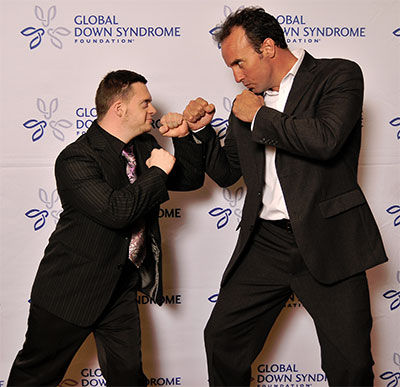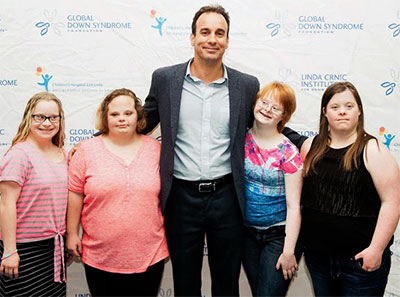Crnic Institute Makes "A Game-Changing Discovery"
CU Researchers find links between Down Syndrome and Immune System

By Mark Couch
(May 201 8) Researchers from the University of Colorado School of Medicine are conducting breakthrough research indicating that Down syndrome could be considered a disorder of the immune system.
The findings announced in the journals eLife and Scientific Reports are a significant development in understanding Down syndrome.
“Down syndrome has been classified as a mental disorder, as an intellectual disability, as a brain condition,” said Joaquín Espinosa,
In between meetings with his laboratory’s researchers on a busy day last January, Espinosa rattled through a list:
- “You can say that Down syndrome is a genetic condition where people are protected from solid cancers.
- “You can say that people with Down syndrome are the largest human population with a predisposition to autoimmune disorders – 30 percent – celiac disease, autoimmune hypothyroidism, type 1 diabetes, autoimmune skin conditions, rheumatoid arthritis.
- “People with Down syndrome are the largest human population with a genetic predisposition to early-onset Alzheimer’s disease – 100 percent.”
 Then, he ties together the conditions on the list: “So Down syndrome is many things,” Espinosa said, “and then when you put every one of those through the prism of an immune disorder, it makes sense every time.”
Then, he ties together the conditions on the list: “So Down syndrome is many things,” Espinosa said, “and then when you put every one of those through the prism of an immune disorder, it makes sense every time.”
Michelle Sie Whitten, president
That discovery is now the foundation for a scientific program that could have health benefits for all.
“It’s one of those beautiful scientific journeys, where we just followed the data, followed the science and it may take you places you didn’t want to go or to places you didn’t anticipate you were going to go,” Espinosa said.
For Espinosa, that is certainly true. A cancer biologist, he
“The Crnic Institute had recruited Dr. Tom Blumenthal as executive director, who was my chair in Boulder,” Espinosa said. “What he did was create a grant program for scientists who were within the University of Colorado. I applied. I knew Tom very well and I wanted him to do well. I was super busy at the time with my cancer research. I didn’t necessarily have an interest in Down syndrome, but I thought OK, this seems like a good opportunity to start a new line of research.”
That project opened a new path in Espinosa’s career, first as associate director for science at the Crnic Institute since 2015 and now as its executive director since July 2017.
“I’m not an immunologist. In fact, to some
“And now this has become the centerpiece of a research program, trying to understand how this immune dysregulation contributes to the many facets of Down syndrome.”
Triggering the immune system to fight cancer has been intensified
 “It makes sense that a person who has a hyper-activated antiviral response will have a tendency to autoimmune conditions,” Espinosa said. “The interferon pathway, the same set of molecules that we use to fight
“It makes sense that a person who has a hyper-activated antiviral response will have a tendency to autoimmune conditions,” Espinosa said. “The interferon pathway, the same set of molecules that we use to fight
Espinosa cites health conditions, such as leukemia congenital heart defects, that can result from overactive autoimmune systems and that are more common among people with Down syndrome. Additionally, hyper-activation of the immune system in the brain is toxic, killing neurons.
Connecting the dots, though, is much harder than it sounds and more work needs to be done before
“It is simple in concept, although technologically quite an amazing feat,” Espinosa said. “We did a functional genomics approach, meaning you measure thousands and thousands of genes or thousands and thousands of proteins and hundreds of metabolites. You’re taking a lot of measurements. It’s difficult in practice, but simple in concept.”
The Human Trisome Project at the Linda Crnic Institute is designed to be the largest and most comprehensive study of why individuals with Down syndrome, also called trisomy 21, are protected from some health conditions, such as cancer, while highly predisposed to others, such as Alzheimer’s disease. For the project, the research team is recruiting persons between 6 months and 89 years old, with or without Down syndrome.
“You’re looking at as much as you can, casting a big net and then asking, ‘What are the things that are different in people with Down syndrome relative to our control group of individuals that don’t have Down syndrome but as far as we can tell they don’t have any other differential variable in the control group?’ When we do that, in every case, at the top of the chart is the immune system and specific aspects of the immune system. “
By identifying the potential source of concern, options for therapies can be considered. One way is to consider how the human body naturally blocks interferon, proteins that activate usually to respond to a virus or other pathogen. The Crnic Institute is looking at proteins that neutralize interferon and developing experiments to study them.
Getting a good map and charting the multiple paths is a daunting task that will require help from many supporters. Supporters include the Global Down Syndrome Foundation, the Anna and John J. Sie Foundation, the School of Medicine and Biogen.
Historically, the primary federal agency providing funding research on Down syndrome has been the National Institute of Child Health and Human Development because the syndrome was originally cast as a pediatric condition. But today, people with Down syndrome commonly live into adulthood, with some living into their 60s.
Espinosa hopes to build on the understanding that there are health benefits for all that can result from the Crnic Institute’s work and that deserve support from other federal agencies. Earlier this year, U.S. Rep. Mike Coffman, who represents the congressional district that includes the Anschutz Medical Campus, introduced legislation directing the U.S. Department of Veterans’ Affairs to establish Alzheimer’s disease research, education, and clinical centers that include a scientific focus on the connection between Down syndrome and Alzheimer’s disease.
“It’s what we call therapeutic leverage,” Espinosa said. “As you’re trying to help people with Down syndrome, you end up learning about other conditions and most likely helping typical people with related conditions. The immune system is everywhere in your body, so it has this power either making trouble or fixing things for a large number of things.”